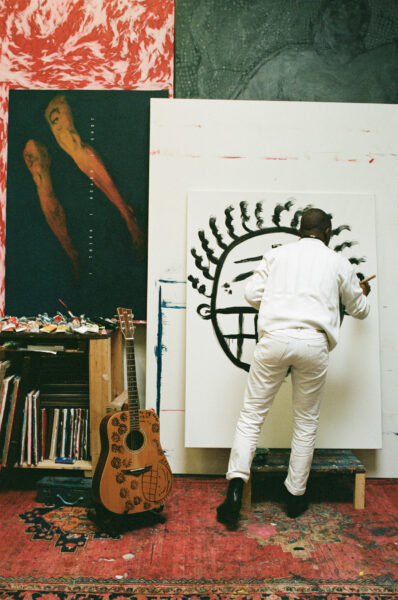Había una vez en lo que hoy conocemos como Nigeria un mundo Yoruba en el que solo existía el cielo, un inmenso mar que cubría todo y en un gran pantano con algunos seres animales. El dios Obatala, viendo la desolación del mundo, pensó que seria bueno mejorar la tierra con otras formas de vida y con una superficie solida donde pudieran vivir los orichas que representan la diversidad de dioses de los Yoruba. Durante esos primeros tiempos solo la diosa Olokun vivía en la tierra gobernando el inmenso mar ya que los otros dioses vivían en el cielo acompañando a el dios máximo Olorum.
El dios obatala se acerco a Olorum y le pidió que le diera el poder para viajar a la tierra y crear tierra para vivir. El dios Olorum, acepto y envió a obatalá donde el dios Orunmila El dios de la sabiduría y la adivinación para que le diera las instrucciones de como crear la tierra firme y sus habitantes.
El dios Orunmila recibió a Obatala y le explico que para crear tierra firme en los dominios acuáticos de Olokun tendría que conseguir algunos elementos importantes. Para ello tendría que conseguir una cadena dorada que colgaría del cielo y asi descender sobre las aguas sin caer en ellas. Luego tomando una concha de caracol llena de arena que debería verterla sobre el mar lentamente hasta que se formara un pequeño montículo de arena.
Luego debería poner una paloma y una gallina para que ellas, con sus patas escarbaran la arena y asi esparcieran hacia todas las direcciones la arena formando con esto valles y montañas.
Y asi lo hizo obatala, bajo por la cadena de oro con una concha llena de arena, una gallina y una paloma y cumpliendo las instrucciones vio como de las patas de la gallina y la paloma comenzaba a formarse extensiones de tierra sobre el mar. Y luego obatala salto sobre las tierra formada y la llamo ife. El reino de la tierra seca. Para celebrar el nacimiento de la nueva tierra seca y para permitir que otros seres vivieran allí, Obatala, tomo una nuez de palmera y la planto. Y de allí surgio la primera palmera en la tierra y esta palmera dio frutos y sus frutos cayeron a la tierra fértil y otras palmeras crecieron formando un primer bosque de palmeras.
Olorum envió a su sirviente el chamaleon Agemo para que supervisara los avances de Obatala cuando Agemo llego el dios se quejo de que no había suficiente luz para que los bosques crecieran cubriendo toda la tierra seca. El camaleón llevo la queja a dios supremo Olorum y este viendo los progresos de Obatala, creo el sol para que con sus rayos y su calor le ayudaran a las plantas a crecer y multiplicarse.
Y el mundo Yoruma se creo, pero todavía faltaba algo. No había seres que recorrieran y vivieran en esas tierras. Asi que Obatala creo multiples figuras de hombres y mujeres con un poco de arcilla y le pidió al dios supremo Olorum que les diera el aliento de vida. Este soplo sobre ellos y el mundo yoruma se lleno de hombres y mujeres. Obatala se sintió feliz con la creación final del hombre, pero Eshu el espíritu embaucador le ofrecio vino de palma para que celebrara y este gustoso lo tomo. Pero tomo tanto que se emborracho y comenzó a crear figuras con miembros retorcidos, espaldas jorobadas y otras muchas deformaciones. Y cuando Olorum les dio vida, estos seres comenzaron a vagar por la tierra con sus deformación. Obatala al despertar de su borrachera vio estos seres y sintió pena por ellos y arrepentido decidió convertirse en el protector y defensor de aquellos hombres con discapacidades. Y cuentan los yorumas que hasta el día de hoy todo ser con alguna discapacidad es protegido por el dios obatala. Después de terminar su labor Obatala regreso a la cadena de oro que colgaba de el cielo y regreso a el para desde allí vigilar su creación.
Olokun la diosa del mar se&




